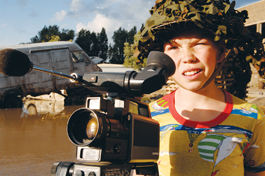home | metro santa cruz index | movies | current reviews | film review

Photograph by Maggie Ferreira
FILMING ON THE SLY: Young Will Poulter helps remake 'First Blood' in 'Son of Rambow.'
Commandos
'Son of Rambow' is an all-ages winner about youthful cinema love
By Richard von Busack
The unique British movie Son of Rambow by director/writer Garth Jennings looks like a brilliant debut, and in a way it is. Jennings and his producing partner, Nick Goldsmith, had to put Son of Rambow on hold when they went to work on The Hitchhiker's Guide to the Galaxy. That particular film was the definition of a cult movie: a demonstration of sarcastic humor, flamboyant acting and technological inventiveness untethered by more serious human concerns of love and need--concerns that mean little or nothing to a young, nihilist, stoned or insomniac audience. This is not a putdown, because I've been all four at one time or another. (But burn one or stay up late enough and Southland Tales looks like Citizen Kane.)
Son of Rambow's center is a love story with the movies; it includes a one-of-a-kind scene of losing one's cinematic virginity. In 1982 in a remote and dowdy English village, hiding in a rowboat hung from the ceiling of a storage room, Will Proudfoot (Bill Milner) sees a VHS bootleg of Sylvester Stallone in First Blood. Will is a member of the strict Plymouth Brethren, raised in that faith by his mother (Jessica Stevenson) after his father dropped dead. Their god requires the women to wear kerchiefs on their head; he also commands his followers to nonviolence and orders them to stay away from movies and TV.
The savagery of the first Rambo movie electrifies Will. He had already been a shrimp-size William Blake, illuminating his Bible with multicolored cartoons. Now he fantasizes animated dreams of bombardments and rescues. He plans guerrilla attacks on his mortal enemy, a scary tin-can-headed scarecrow in a nearby field.
His partner in fantasy is the most troubled child in school, the diabolical Lee Carter (Will Poulter), a pug-nosed Cagneyesque child whose brother is part of the village's answer to organized crime. Selling bootlegs of the movies at the local theater is one of his scams. Will and Lee appropriate the video camera and get to work filming a Rambo sequel in the local woods.
Meanwhile, in what seems to be an unrelated story, a French exchange student arrives. Didier (Jules Sitruk) has been infected with the New Wave virus. He displays a pop-cultural cornucopia of vinyl clothes, pouffy hair, Adam Ant posters and Duran Duran records. You have a hard time telling what sex he is at first, even with his sooty Prince-like mustache. But the school falls over for him. The girls line up for kisses, and the adoring boys follow him through the school as if they were a vee of geese. Ultimately, Didier's charisma ropes in Will, much to the fury of a jealous Lee.
If Jennings seems to be working from a model, it shows most obviously in the Didier scenes; the processionals are like the nonjokes in Napoleon Dynamite about being too cool for school. The Nino Rota/Danny Elfman-style circus marches on the soundtrack remind us, too, that this is a movie about movies.
The animation/live-action approach can often make for a knick-knacky film in which the crazy props have to do the work. Thus the single joke-shop scene in Pee-wee's Big Adventure leads to the kitschy antiques in Amélie or to the hamburger phone in Juno. In Son of Rambow, however, the inventiveness continues beyond the weird old artifacts. Jennings' clever setting up of slapstick would have kept him employed by Mack Sennett or Hal Roach. His use of color weights this comedy, too. The Brethren's church would be a natural source for cheap humor, but Jennings declines to rise to the bait, in order to give Will's loneliness some dimension.
The child's bedroom is a wooden, nigh-medieval attic. Jennings is serious, too, in pulling back the camera to show us the silent mother, Mary, as she washes her dishes. She could be a figure in a lovely, morose Dutch painting.
The England in Son of Rambow is also like nothing I have ever seen in a film before. Some of the backgrounds resemble Egoyan's Felicia's Journey, particularly in the humongous concrete hourglasses of the cooling towers at an abandoned power plant. Whatever else you can say about the Rambo movies, they were verdant, whether the killer was prowling the Washington pines or Southeast Asian swamps. Jennings has found a look to match those fantasies in the almost subtropical forests and riverbanks in England; I had no idea these kinds of landscapes still existed in Great Britain.
The buildings are good, too. The frowning brick school is wonderfully dismal, with the useless half-heard lessons part of the background noise (we note a lecture as well as an educational film that warns us about what a potentially dangerous invention the wheel is). Son of Rambow deserves to be a huge hit, even if the accents and slang might hitch the slow Yanks. Like Hot Fuzz, Son of Rambow reminds us that what looks like worthless trash cinema here can have a liberating effect on hidebound, far-off lands.
![]() SON OF RAMBOW (PG-13; 96 min.), directed and written by Garth Jennings, photographed by Jess Hall and starring Bill Milner, Will Poulter and Jules Sitruk, opens Friday at the Del Mar in Santa Cruz.
SON OF RAMBOW (PG-13; 96 min.), directed and written by Garth Jennings, photographed by Jess Hall and starring Bill Milner, Will Poulter and Jules Sitruk, opens Friday at the Del Mar in Santa Cruz.
Send a letter to the editor about this story.
|
|
|
|
|
|